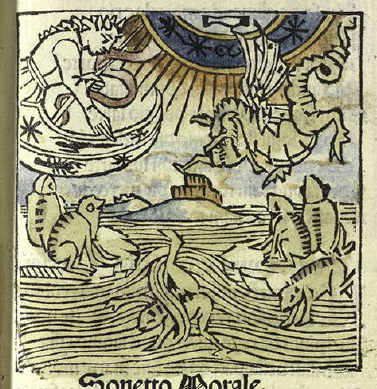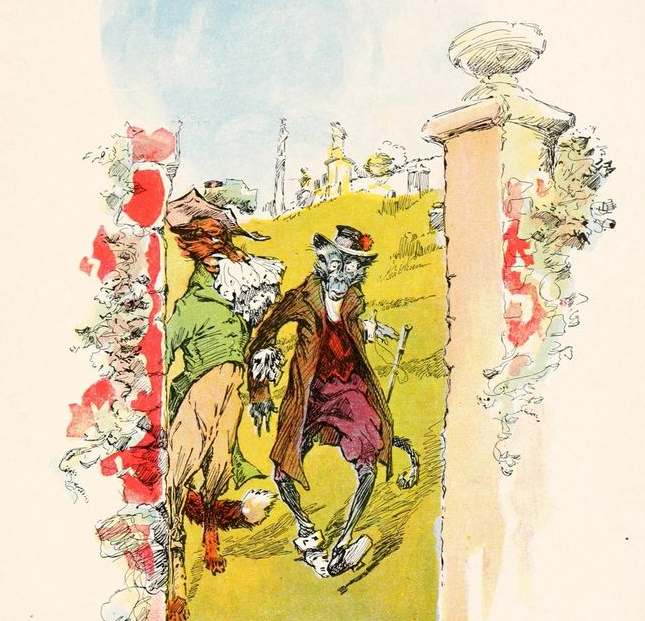And here's a random proverb and a random LOLCat too :
Stories found in public domain Greek textbooks, plus the Daily Greek Vocabulary Challenge, learning Greek words through proverbs and sayings.
Tuesday, April 29, 2025
Greek Reading: Fables 53
Monday, April 28, 2025
Greek Vocabulary Challenge: April 29
And now, some commentary:
And here's a random proverb and a random LOLCat too :
Sunday, April 27, 2025
Greek Reading: Fables 52

And here's a random proverb and a random LOLCat too :
Friday, April 25, 2025
Crossword Puzzle 22-23-24
- Ἀγροίκου μὴ καταφρόνει ῥήτορος.
- Ἄκουε τοῦ τέσσαρα ὦτα ἔχοντος.
- Ἀκρὸν λάβε, καὶ μέσον ἕξεις.
- Ἄνθρωπος μέτρον.
- Καθὼς ἡ μήτηρ καὶ ἡ θυγάτηρ.
- Κύων σπεύδουσα τυφλὰ τίκτει.
- Λέων τὴν τρίχα, ὄνος τὸν βίον.
- Οἶνος καὶ παῖδες ἀληθεῖς.
- Ὄνος λύρας ἀκούων κινεῖ τὰ ὦτα.
- Πόλλ᾿ ἐλπίδες ψεύδουσι βροτοὺς.
- Πολλοὶ ἰατροὶ βασιλέα ἀπώλεσαν.
- Σιγηροῦ ποταμοῦ τὰ βάθη γυρεύει.
- Σὺν Ἀθηνᾷ καὶ χεῖρας κίνει.
- Ὕπνος δεινὸν ἀνθρώποις κακόν.
- Ὦτα καὶ ὀφθαλμοὶ πολλοὶ βασιλέως.
And here's a random proverb and a random LOLCat too :
Thursday, April 24, 2025
Greek Reading: Fables 51
And here's a random proverb and a random LOLCat too :
Wednesday, April 23, 2025
Greek Vocabulary Challenge: April 24
And now, some commentary:
And here's a random proverb and a random LOLCat too :
Tuesday, April 22, 2025
Greek Reading: Fables 50
And here's a random proverb and a random LOLCat too :
Monday, April 21, 2025
Proverbs Slideshow/Crossword: April 22
The slideshow is embedded in the blog post, and you can also access today's slideshow directly, full-sized view. And remember: each time you see the English translation on a slide, you can click to access the original blog post with the notes for each proverb.
- Ἁλιεὺς πληγεὶς νοῦν οἴσει.
- Ἅπασα δὲ χθὼν ἀνδρὶ γενναίῳ πατρίς.
- Δασύπους κρεῶν ἐπιθυμεῖ.
- Ἔργα νέων, βουλαὶ δὲ μέσων, εὐχαὶ δὲ γερόντων.
- Ἔριν μίσει.
- Ἔχθρας διάλυε.
- Μῶρα γὰρ μῶρος λέγει.
- Νυμφίου βίον ὑμεῖς ζῆτε.
- Οὐ τοῖς κούφοις ὁ δρόμος καὶ οὐ τοῖς δυνατοῖς ὁ πόλεμος.
- Οὐ χρείαν ἔχουσιν οἱ ἰσχύοντες ἰατροῦ ἀλλ᾽ οἱ κακῶς ἔχοντες.
- Οὐδεὶς προφήτης δεκτός ἐστιν ἐν τῇ πατρίδι αὐτοῦ.
- Οὐδὲν πρὸς τὴν Παρμένοντος ὗν.
- Πρὸ τῆς νίκης τὸ ἐγκώμιον ᾄδεις.
- Σεαυτὸν εὖ ποίει.
- Ὑφ' ἡδονῆς ὁ φρόνιμος οὐχ ἁλίσκεται.
Sunday, April 20, 2025
Greek Reading: Fables 49
And here's a random proverb and a random LOLCat too :
Friday, April 18, 2025
Greek Vocabulary Challenge: April 19
And now, some commentary:
And here's a random proverb and a random LOLCat too :
Thursday, April 17, 2025
Greek Reading: Fables 48
And here's a random proverb and a random LOLCat too :
Wednesday, April 16, 2025
Greek Vocabulary Challenge: April 17
These are the proverbs (and there are always more proverbs at the blog):
And now, some commentary:
And here's a random proverb and a random LOLCat too :
Tuesday, April 15, 2025
Greek Reading: Fables 47
And here's a random proverb and a random LOLCat too :
Monday, April 14, 2025
Crossword Puzzle 19-20-21
- Ἀεί τι καινὸν ἡμέρα παιδεύεται.
- Ἀνδρὶ σοφῷ πᾶσα γῆ βατή.
- Ἄνδρῶν ἡρώων τέκνα πήματα.
- Βελλεροφόντης τὰ γράμματα.
- Δεινῆς ἀνάγκης οὐδὲν ἰσχυρότερον.
- Δὶς κράμβη θάνατος.
- Ἐλέφαντα ἐκ μυίας ποιεῖς.
- Ἰατρὲ, θεράπευσον σεαυτόν.
- Καδμεία νίκη.
- Μέτρον ἄριστον.
- Μὴ μοῦ τοὺς κύκλους τάραττε.
- Οὐδείς ἐστιν ἅπαντα σοφός.
- Ὄφιν ἐν τῷ κόλπῳ τρέφεις.
- Πολιτικὸν ζῷον ὁ ἄνθρωπος.
- Φάρμακον ὀργῆς ὁ χρόνος.
And here's the crossword puzzled based on a missing word from each proverb: printable Crossword PDF. I've pasted in screenshots below so you can see what the crossword looks like:
And here's a random proverb and a random LOLCat too :






















